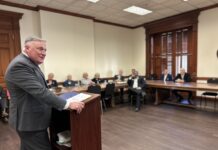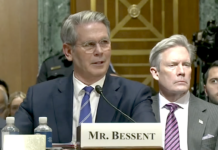
(GA Recorder) — A rift between Camden County and the owner of the property planned for Spaceport Camden may spell disaster for the venture that’s about to take center stage before Georgia’s Supreme Court in a couple of weeks.
A statement from Union Carbide Corp. claims that the company is no longer contractually bound to an option agreement after Camden voters rejected the county’s purchase of 4,000 acres for the coastal Georgia rocket launch facility. In the March 8 special election, voters overwhelmingly opposed the county spending more money on a project that has already cost taxpayers $11 million.
Union Carbide “does not intend to convey the property to the county pursuant to the prior Option Agreement,” spokesman Tomm Sprick sent in an email Friday. “(Union Carbide) remains committed to ensuring the long-term conservation value of the property.”
Camden County, however, counters that the agreement is still legal and it is committed to seeing it through. The contract dispute is another obstacle for the controversial project, with the county preparing for an Aug. 23 hearing in the state’s highest court.
Attorneys for the county will argue that residents should not be left to decide the fate of a county land deal through a referendum.
“Union Carbide most certainly has a contract with Camden,” said a statement from the county’s legal counsel, the Robbins Firm. “The county has indicated that it is ready, willing and able to close. We expect Union Carbide to honor its contractual commitments. We have advised Union Carbide of our position.
“As we have stated before, we do not believe the referendum was legally proper. We believe the Supreme Court will agree with the county.”
Camden officials have promoted the spaceport as the gateway to a $450 billion industry that can diversify the local economy, increase science and technology opportunities for students, and attract high-paying jobs.
Spaceport opponents accuse the backers of exaggerating economic benefits. The National Park Service and conservationists have warned of rocket explosions causing wildfires and contaminating coastal marshes and barrier islands.
The Camden County Joint Development Authority budgeted the first seed money for the spaceport about a decade ago. Over the years, the county spent millions applying for a permit with the Federal Aviation Administration and more expenses have racked up by extending the land agreement multiple times since 2015.
The FAA granted a license in 2021 for up to 12 rocket launches a year, but it was conditional on the commercial spaceport being built on the property located at the mouth of the Satilla River and Crooked River and inland from Cumberland Island and Little Cumberland Island.
Pesticides were manufactured on the property until 2012. As early as the 1960s, the site was used for the testing of rocket motors, tear gas and other chemicals. A 1971 explosion at a Thiokol Chemical Corp. munitions plant killed 29 people and injured dozens more.
Lobbyists have promoted the spaceport to Gov. Brian Kemp and other lawmakers, but the project has not received the type of financial backing and other state-level incentives as economic development projects like Rivian Automotive’s electric truck plant that’s being built in east Georgia.
Camden County Administrator Steve Howard has said the county is considering a public-private partnership for a spaceport that he says continues to receive strong interest from businesses, educational institutions, and the U.S. Department of Defense.
The spaceport’s license is also being challenged in a federal lawsuit filed by One Hundred Miles and the Southern Environmental Law Center. The lawsuit claims the federal aviation agency failed to properly analyze the risks posed by rocket explosions after the county downsized its plans to smaller rockets.







